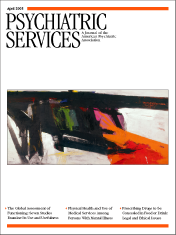To the Editor: The second-generation antipsychotic medications represent a new generation of therapies that have greater efficacy, especially for negative symptoms, with fewer extrapyramidal side effects (
1). Weight gain has become a significant issue with the use of newer antipsychotic medications, and it has been found to lead to noncompliance with medication regimens and medical complications (
2). Quetiapine is a second-generation antipsychotic that blocks both dopamine and serotonin (5HT) receptors (
3). Weight gain is a significant side effect associated with quetiapine use (
4,
5). Weight loss is an infrequent adverse effect (
3). Anorexia was frequently reported in premarketing evaluations (
3).
Here we report a case of anorexia and significant weight loss (more than 20 pounds) associated with quetiapine use.
Mr. A is a 68-year-old divorced white male with a history of schizophrenia, residual type. He was already taking olanzapine when we took over his outpatient care. The daily olanzapine dosage was 12.5 mg for 24 months. Mr. A's medication was cross-tapered to quetiapine because of sedation and the fact that he was not maintaining good glycemic control. Mr. A is 5 feet 6 inches in height, and he weighed 135 pounds when he started taking olanzapine. His ideal body weight is 138 pounds. He gained five pounds in 24 months while he was taking olanzapine and weighed 140 pounds when he started taking quetiapine. He tolerated quetiapine well without any significant side effects. The dosage was gradually titrated over four to six weeks to 500 mg a day.
After taking quetiapine for five months, Mr. A started to experience a significant reduction in his appetite, and he began to lose weight. Over the next four months, his weight decreased to 119 pounds. He stopped eating almost entirely and reported that he wasn't hungry at all. Because he is a smoker, he was referred to his primary care physician to rule out any possible malignancy. Laboratory examinations—complete blood count, liver function and renal function tests, and electrolytes—were performed, along with a colonoscopy and a computed tomography scan of his head, chest, and abdomen. All the results were negative. Other possibilities, including depressive symptoms and paranoid thinking (for example, a belief that his food was poisoned) were explored. Mr. A denied any changes in mood, and the staff at the group home where he resides reported that they did not observe any behavioral changes indicating a depressed mood.
We decided to stop prescribing quetiapine and resume the use of olanzapine. Within a week Mr. A started to eat and started gaining weight. Over two months he gained 14 pounds. His blood sugars are maintained with antidiabetic medications.
This case illustrates the importance of monitoring weight changes among patients who are taking second-generation antipsychotic medications. Most of the time clinicians are concerned about weight gain but not weight loss. With the newer medications, which might be weight neutral, clinicians should pay attention to weight loss as well.

